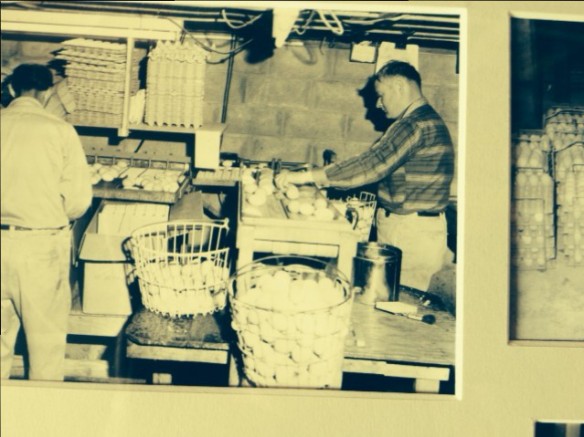With the exception of washing baby bottles, when I married and changed my career to poultry farming, my clinical work was mainly vaccinating chickens before they came into production, for New Castle and Pox. There are many strains of New Castle, but it is a disease that essentially affects the central nervous system.
Every year, in the late spring or early summer, we would join Marty’s parents, Rosie and Abie, at our farm and then later at their farm, for inoculating. Rosie would wear an old housedress, rubber galoshes, and a babushka. I had jeans, a painter’s hat, and sneakers. Our employees would coax or carry the chickens to one side of the room, and create a pen with screens; to keep the vaccinated birds separate from those that weren’t. We screened off a section of the room with enough chickens for us to handle easily. When the chickens in that pen were vaccinated, we moved the fencing to form a pen for the next batch. This procedure was repeated until each chicken received the vaccine.
The men would catch about three chickens at a time and spread their wings out on a table, so Rosie and I could stick each chicken with a needle and vaccine, between the wing and the web; referred to as the wing /web method. We had to work quickly; the dust was flying and the chickens were squawking. Every now and then we would stick ourselves. You couldn’t blame the hens if they gave you an occasional “k’nip.” After all, don’t you feel like “sticking” it to whomever gives you a “shot”?
Rosie would always rinse the remaining drops of ketchup from the bottle, when cooking, to use in soups and sauces. She would also add a little water to the almost empty vial, to remove all of the remaining vaccine. I too, like to salvage the last drop from jars and bottles, but ketchup isn’t exactly vaccine. When I mentioned this to Marty, he accused me of overreacting and explained the concept of “herd immunity”. Many birds “escape”, and it was of little consequence if some chickens received a diluted dose of the vaccine. If most of the flock received the vaccine, the bird that avoided inoculation was not apt to get sick, because the incidence of disease carrying organisms was low. The possibility of an outbreak, therefore, was slim.
It wasn’t long before my mother-in-law and I joined the ranks of unemployed “chicken stickers”, when we adopted more effective, and less labor intensive means of immunization. One of the preferred techniques was disseminating the vaccine in a water spray, at night, when the chickens were asleep.
We are able to maintain a higher standard for immunizing people because the person administering the vaccine has control of the procedure. However this person has no control over the population that chooses not to be vaccinated, for fear of adverse results, and is willing to benefit from the “herd immunity” supplied by those who do assume risks. Unless your doctor advises otherwise, it is everybody’s responsibility to share possible risks so infections are few or non-existent.
Vaccinating reminds me in some ways of voting. Recently, I attended a meeting of our town committee where the November elections are the main topic of business. I heard people say, ”Oh, he’s in a safe district, he won’t have trouble getting elected, and my vote won’t be missed.” We can never be sure of the dynamics of politics. Every vote is necessary. Just as we shouldn’t rely on “herd immunity” for immunization, we shouldn’t rely on “herd immunity” in elections. We have a shared responsibility to control the possibility of an epidemic through immunization. We have a shared responsibility to elect competent public officials through the ballot.


Always so interesting! I really look forward to your entries. LS
Thank you Letty. Waiting to hear about your memoirs. Lisa did compile my blogs in a booklet
I too wrote an essay on vaccinating chickens to model narrative writing for my 4th graders. Some similarities in our text although I would never THINK to equate it with voting – positively brilliant! Keep up the great work!
It just made me think how we use “herd immunity as an excuse fr abrogating responsibiiities. “let george do it” We are all George. Thank you, Madeline.
Barbara, you have done the most interesting things – love this story!
Diana xo
Thank you Diana. When you’ve been around as long as I have, you experience quite a bit.
Thanks Barbara. Lovely. So true that we cannot use immunity as an excuse not to vaccinate and certainly not a reason not to vote. Both can lead to devastating results- epidemics of disease and bad politics.
We tend to use “herd immunity” as an excuse for a lot of thing like listening to NPR without making a contribution. Thank you Judy. I welcome your comments
Some story! My favorite part is the ketchup bottle (and reading about your outfit).
Thank you Barbara. It doesn’t stop at ketchup bottles. I even found an old painter’s hat among my beach things.
What an interesting blog. First, the story of how you vaccinated chickens, and then the information about herd immunity. I hadn’t ever considered that. Followed by the relationship with voting – an excellent segue. Now I know where Lisa gets her writing skills!
Thank you, Gabby. It’s very flattering to think that I am a mentor for Lisa. She has many talents that I don’t have. We tend to rely on “herd immunity” as an excuse for shirking responsibilities. Dood hearing from you.